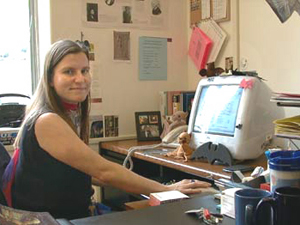Helping career dreams come true
More than 1,500 staff at Berkeley have participated in the Career Development Opportunity Program — and there’s still money available
![]()
| 26 February 2003
| |  Robin Walker, an administrative specialist at the Center for the Study of Sexual Culture, will soon be completing her undergraduate degree, thanks to some financial help from the Career Development Opportunity Program. D. Lyn Hunter photo |
Robin Walker, an administrative specialist at the Center for the Study of Sexual Culture, has been inching toward her bachelor’s degree from San Francisco State University for almost 10 years now.
“It’s very expensive,” she explains, “so I can usually take only one course per semester.”
But Walker found a way to offset some of her educational costs: the Career Development Opportunity Program (CDOP), administered by the campus’s Office of Human Resources.
The pilot program — which began last August — offers eligible staff up to $5,250 per year to receive training that will broaden their skills and enhance their careers within the UC system.
Walker applied for funds last fall, and the program has since given her nearly $1,600 to cover tuition and pay for books. “It was such a big help,” she says. “I should finally have my diploma by the end of this semester.” She plans to attend graduate school and obtain a degree in museum studies, with the long-term goal of working at a campus museum as an administrator or program developer.
Walker is one of more than 1,500 staff CDOP has assisted over the last six months, says Steve Overcashier, the program’s manager. Many participants say the funds have helped make their dreams come true.
“One person told us that because of CDOP she can now complete her X-ray-technician certification, a course of study she was forced to abandon many years ago,” he says. “Not only that, but because of her anticipated salary increase, she and her husband will finally be able to buy a home.”
So far, the program has awarded nearly $1.5 million to cover the cost of classes, workshops, and trainings. “People are using the money to finish or start undergraduate or graduate degrees, gain supervision and management skills, or learn about information technology, among other things,” Overcashier says.
Other participants have taken advantage of the Phase II portion of the program, which provides money to pay for four career-counseling sessions. These sessions are intended to help staff determine what kinds of CDOP-funded classes or training they should pursue.
The majority of participants in CDOP are administrative assistants, specialists, or analysts, says Overcashier, with computer programmers and student-affairs officers following close behind.
“This is a great program,” says Robin Walker, “not just because it helped me pay for school, but also because it shows that the university values us as employees, and is willing to help us move up through the ranks.” She says she hopes the program — which is scheduled to end on June 30 — is renewed next year.
Senior campus and UCOP administrators are expected to determine CDOP’s fate over the next couple of months, says Overcashier. “Staff and administrators alike agree that the program is very beneficial. It not only further develops our already talented staff, but can help keep morale up during these difficult budgetary times.”
While awaiting news of the program’s fate, Overcashier encourages campus staff to take advantage of the funds that are still left in this year’s pot. Participants must begin their classes before the June 30 cut-off date. For information on how to apply, visit hrweb.berkeley.edu/learning/cdop.htm.

